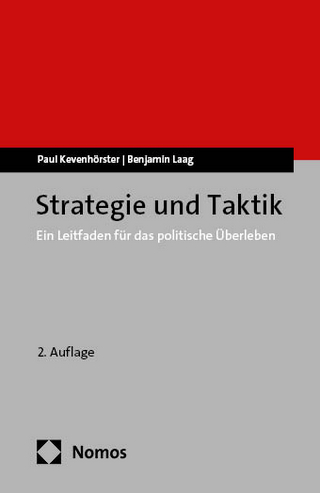
Multinational Rapid Response Mechanisms
Routledge (Verlag)
978-1-138-54398-0 (ISBN)
Examining lessons from deployments by the AU, the EU, NATO, and the UN in the Central African Republic, Mali, Somalia and counter-piracy in the Horn of Africa, the contributors focus upon the following questions: Was there a rapid response to the crises? By whom? If not, what were the major obstacles to rapid response? Did inter-organizational competition hinder responsiveness? Or did cooperation facilitate responsiveness? Bringing together leading scholars working in this area offers a unique opportunity to analyze and develop lessons for policy-makers and for theorists of inter-organizational relations.
This work will be of interest to scholars and students of peacebuilding, peacekeeping, legitimacy and international relations.
John Karlsrud is senior research fellow and manager for the Training for Peace program at the Norwegian Institute of International Affairs (NUPI), and external associate at the Centre for the Study of Globalisation and Regionalisation, University of Warwick, where he also earned his PhD. He has been a Fulbright fellow at the Centre on International Cooperation, New York University (NYU), and a visiting fellow at the International Peace Institute, New York. John works on peacekeeping, peacebuilding, and humanitarian issues. Books include Norm Change in International Relations (Routledge, 2016), and The Future of African Peace Operations: From the Janjaweed to Boko Haram (Zed Books, 2016, co-edited with Cedric de Coning and Linnea Gelot). Yf Reykers is a post-doctoral research fellow at the Leuven International and European Studies Institute at KU Leuven, Belgium, where he also obtained his PhD in 2017. He has been a visiting scholar at the Center on International Cooperation at NYU and at Aarhus University. His research focuses on multinational military operations. He studies issues relating to the accountability of military interventions, rapid response mechanisms, and inter-organizational relations. His work has been published in journals including Contemporary Security Policy, European Security, International Peacekeeping, and Parliamentary Affairs.
Introduction: Rapid response mechanisms—strengthening defense cooperation and saving strangers? PART I: INSTITUTIONAL ANALYSIS OF RAPID RESPONSE MECHANISMS 1. Tools in a toolbox: The African Union’s repertoire of mechanisms for addressing peace and security on the continent 2. EU Battlegroups: From standby to standstill 3. The NATO Response Force: Bellwether of NATO’s commitment to regional deterrence 4. United Nations rapid reaction mechanisms: Toward a global force on standby? PART II: MULTINATIONAL OPERATIONS IN PRACTICE 5. Multinational rapid response forces in the Democratic Republic of Congo—another example of winning battles, but losing the peace? 6. Rapid response and inter-organizational competition: Four international organizations, two key states, and the crisis in the Central African Republic 7. Tangled up in glue: Multilateral crisis responses in Mali 8. EU-NATO inter-organizational relations in counter-piracy operations off the Horn of Africa 9. Conclusion: Military rapid response—from institutional investment to ad hoc solutions
| Erscheinungsdatum | 29.01.2019 |
|---|---|
| Reihe/Serie | Global Institutions |
| Zusatzinfo | 4 Tables, black and white |
| Verlagsort | London |
| Sprache | englisch |
| Maße | 138 x 216 mm |
| Gewicht | 362 g |
| Themenwelt | Sozialwissenschaften ► Politik / Verwaltung ► Allgemeines / Lexika |
| Sozialwissenschaften ► Politik / Verwaltung ► Europäische / Internationale Politik | |
| ISBN-10 | 1-138-54398-5 / 1138543985 |
| ISBN-13 | 978-1-138-54398-0 / 9781138543980 |
| Zustand | Neuware |
| Haben Sie eine Frage zum Produkt? |
aus dem Bereich


